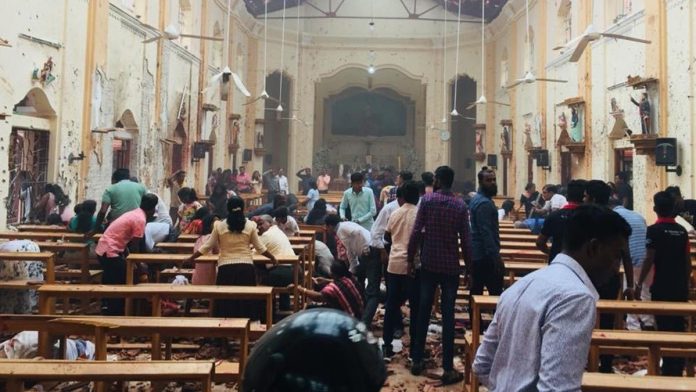
Colombo: Sri Lankan government on Sunday ordered a night-time curfew after the island nation was rocked with eight blasts targeting churches and hotels that killed nearly 160 people across the country.
The curfew will begin on Sunday night at 6:00 pm (local time) and run until 6:00 am (local time), the defence ministry said.
Meanwhile, security has been intensified around the religious places across the capital.
The government has decided to block all social media platforms in order to prevent incorrect and wrong information being spread. This is only a temporary measure”, a release from Udaya R Seneviratne, Secretary to the President said.
Prime Minister Ranil Wickremesinghe did not reveal the initial details of the investigation into the blast and said police will update later.
“The police will update you on this after investigations”, he told reporters when asked. “The police and the security forces have been instructed to bring culprits to book.
On the economic impact of the attacks, he said, “There will be a downward trend, tourism will get affected. There may be fund outflows.
Over 160 killed
The St. Sebastian’s Church in the western coastal town of Negombo bore the brunt of a series of powerful blasts across Sri Lanka on Easter Sunday, with a top priest saying pieces of flesh were thrown all over the walls and on the sanctuary and even outside of the church.
Over 160 people were killed when six near simultaneous and coordinated explosions rocked three churches and three luxury hotels frequented by tourists in Sri Lanka on Easter Sunday, officials said.
Sri Lankan media reports that the Negombo Hospital has reported at least 74 deaths and received 113 injured people from the Sebastian’s Church.
Father Edmond Tillekeratne, social communications director for the Archdiocese of Colombo, said that the blast took place after Easter Mass, and that there were about 30 bodies lying in the area of the church.
He said three priests had been celebrating the mass at the time of the blast. Two of them were badly injured by flying glass and debris, and one was only lightly injured because he was behind the altar.
He estimated that more than a thousand people had come to the church for Easter Sunday “because it is a special day.” Many came from villages, he said.
He described the ground as covered in rubble and shattered glass.
“You can see pieces of flesh thrown all over the walls and on the sanctuary and even outside of the church,” he told CNN.
The church, built in 1946, is one of the many churches in Sri Lanka dedicated to St Sebastian who is considered a martyr in the Catholic Church history.
The Archbishop of Colombo has demanded that those responsible for the Easter Sunday blasts in Sri Lanka to be punished “mercilessly.”
Cardinal Malcolm Ranjith, in a strong statement, urged the government to launch a “very impartial strong inquiry” and to punish those found responsible “mercilessly because only animals can behave like that.”
All easter masses in the Colombo District have been cancelled, the Cardinal announced.
The Shangri-La Hotel in Colombo, which was the site of one of the explosions, released a statement, saying it was one of the several locations in Colombo which were affected by this morning’s attacks.
“We are deeply saddened and shocked by the incident and our thoughts and prayers are with the families of the casualties and those who have been affected.
“We are working closely with local authorities and emergency services to provide our fullest assistance and support to the affected staff and guests.
“Our immediate priority is to look after the safety and wellbeing of all involved. A Shangri-La crisis management team has been activated to provide all necessary support.
Modi condemns blast
Prime Minister Narendra Modi called up the president and the premier of Sri Lanka and conveyed heartfelt condolences over the loss of over 160 lives in terrorist attacks in the island nation on Sunday.
During his conversations with Sri Lankan president Maithripala Sirisena and prime minister Ranil Wickremesinghe, Modi condemned the serial terrorist attacks in the strongest terms, perpetrated at sites including religious places and during a religious festival, according to a statement from the Prime Minister’s Office.
Describing the attacks as “cold-blooded and pre-planned barbaric acts”, Modi said these attacks were another grim reminder of the most serious challenge posed to the entire humanity by terrorism in our region and the entire world.
Check out My543, our comprehensive report card of all Lok Sabha MPs.